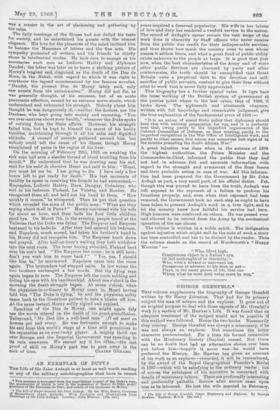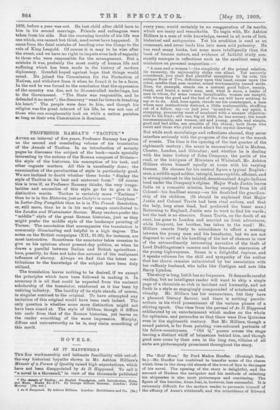GEORGE GRENFELL.* THIS volume supplements the biography of George Grenfell
written by Sir Harry Johnston. That had for its primary subject the man of science and the explorer. It grew out of an original purpose to deal with these Rept:refs of Mr. Grenfell's work in a section of Mr, Hawker's Life. It wes found that an adequate treatment of the subject vroald not be possible if this method were followed. Hence the two books. Necessarily they overlap. George Grenfell was always a missionary, if he was not always an explorer. But sometimes the latter character predominated. For a time his formal connexion with the Missionary Society (Baptist) ceased. But there can be no doubt that ha4 an alternative choice over been put before him—happily it never was—he would have preferred the Mission. 111r. Hawker has given an account of his work ae an explorer—rewarded, it will be remembered, by the award of the Royal Geographical Founder's Medal in 1887—which will be satisfying to the ordinary reader ; but of course the substance of his narrative is concerned with details of missionary labour. These are profoundly interesting and profoundly pathetic. Sorrow after sorrow came upon hiFci as he laboured. He lost the wife married in February, • The j.ife of George Gi•enfett, Congo Missionary and Bzpiorer. By George London: R,T.8. Os. net.]
1876, before a year was out. He lost child after child born to hire in his second marriage. Friends and colleagues were taken from his side. But the crowning trouble of his life was one which, one cannot but think, need never have happened. It came Iron, the fatal mistake of handing over the Congo to the rule of King Leopold. Of course it is easy to be wise after the event, and we have no right to impute even lack of sagacity to those who were responsible for the arrangement. But a mistake it was, probably the most costly of human life and suffering which has been made in the history of modern diplomacy. GrenfeII hoped against hope that things would mend. He joined the Commission for the Protection of Natives, and withdrew from it when be found it to be a farce. In the end ho was forced to the conclusion that the oppression of the country was due, not to ill-controlled underlings, but to the Government. " The State was responsible, and he defended it no more"; the discovery "went far towards breaking his heart." The people were dear to him, and though his religion was the great interest of his life, he was not one of those who can complacently look on while a nation perishes so long as their own Communion is dominant.







































 Previous page
Previous page